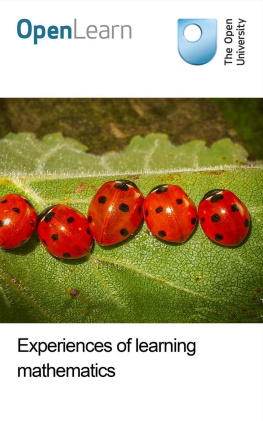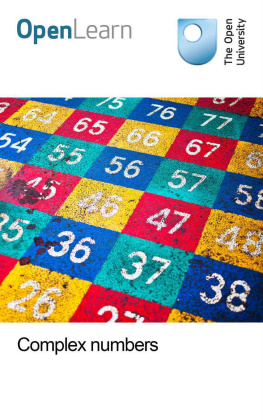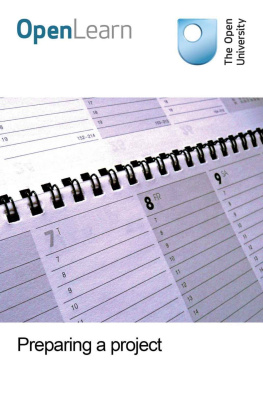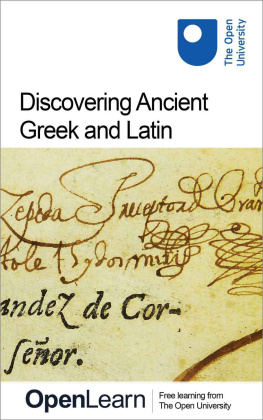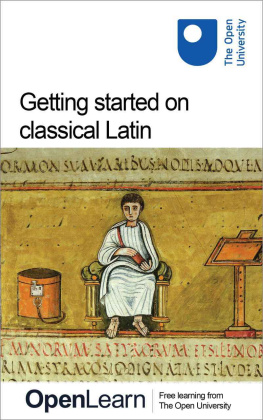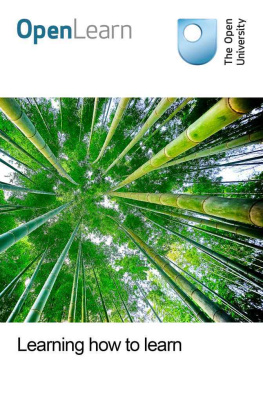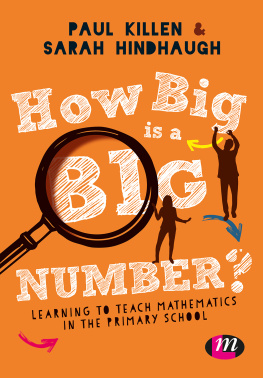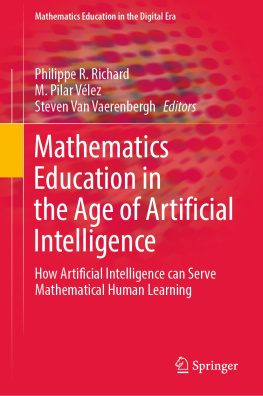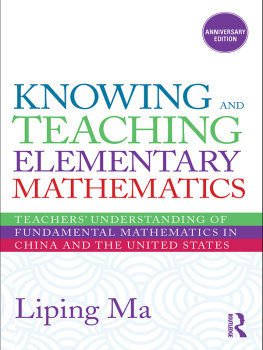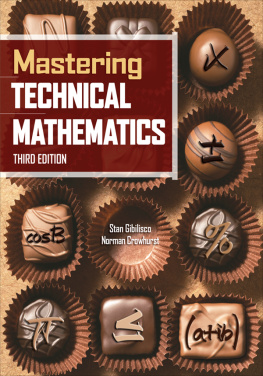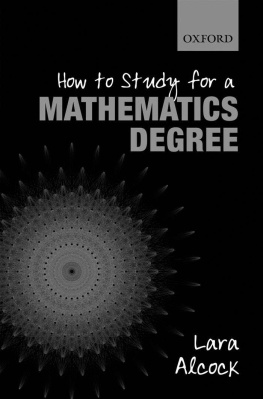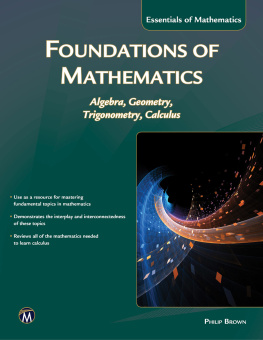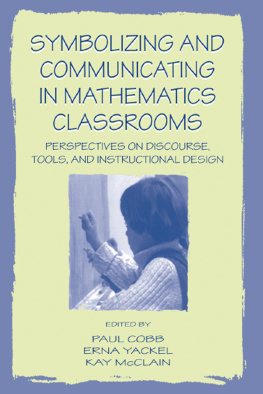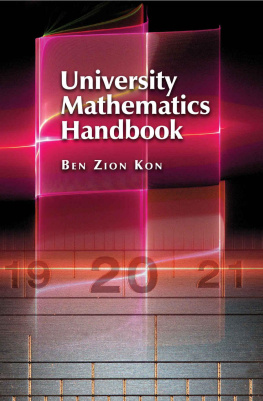University - Experiences of learning mathematics
Here you can read online University - Experiences of learning mathematics full text of the book (entire story) in english for free. Download pdf and epub, get meaning, cover and reviews about this ebook. year: 2016, publisher: The Open University, genre: Children. Description of the work, (preface) as well as reviews are available. Best literature library LitArk.com created for fans of good reading and offers a wide selection of genres:
Romance novel
Science fiction
Adventure
Detective
Science
History
Home and family
Prose
Art
Politics
Computer
Non-fiction
Religion
Business
Children
Humor
Choose a favorite category and find really read worthwhile books. Enjoy immersion in the world of imagination, feel the emotions of the characters or learn something new for yourself, make an fascinating discovery.
- Book:Experiences of learning mathematics
- Author:
- Publisher:The Open University
- Genre:
- Year:2016
- Rating:3 / 5
- Favourites:Add to favourites
- Your mark:
- 60
- 1
- 2
- 3
- 4
- 5
Experiences of learning mathematics: summary, description and annotation
We offer to read an annotation, description, summary or preface (depends on what the author of the book "Experiences of learning mathematics" wrote himself). If you haven't found the necessary information about the book — write in the comments, we will try to find it.
Experiences of learning mathematics — read online for free the complete book (whole text) full work
Below is the text of the book, divided by pages. System saving the place of the last page read, allows you to conveniently read the book "Experiences of learning mathematics" online for free, without having to search again every time where you left off. Put a bookmark, and you can go to the page where you finished reading at any time.
Font size:
Interval:
Bookmark:
About this free course
This free course provides a sample of level 2 study in Mathematics: www.open.ac.uk/courses/find/mathematics.
This version of the content may include video, images and interactive content that may not be optimised for your device.
You can experience this free course as it was originally designed on OpenLearn, the home of free learning from The Open University: www.open.edu/openlearn/science-maths-technology/mathematics-and-statistics/mathematics-education/experiences-learning-mathematics/content-section-0.
There youll also be able to track your progress via your activity record, which you can use to demonstrate your learning.
The Open University, Walton Hall, Milton Keynes, MK7 6AA
Copyright 2016 The Open University
Intellectual property
Unless otherwise stated, this resource is released under the terms of the Creative Commons Licence v4.0 http://creativecommons.org/licenses/by-nc-sa/4.0/deed.en_GB. Within that The Open University interprets this licence in the following way: www.open.edu/openlearn/about-openlearn/frequently-asked-questions-on-openlearn. Copyright and rights falling outside the terms of the Creative Commons Licence are retained or controlled by The Open University. Please read the full text before using any of the content.
We believe the primary barrier to accessing high-quality educational experiences is cost, which is why we aim to publish as much free content as possible under an open licence. If it proves difficult to release content under our preferred Creative Commons licence (e.g. because we cant afford or gain the clearances or find suitable alternatives), we will still release the materials for free under a personal end-user licence.
This is because the learning experience will always be the same high quality offering and that should always be seen as positive even if at times the licensing is different to Creative Commons.
When using the content you must attribute us (The Open University) (the OU) and any identified author in accordance with the terms of the Creative Commons Licence.
The Acknowledgements section is used to list, amongst other things, third party (Proprietary), licensed content which is not subject to Creative Commons licensing. Proprietary content must be used (retained) intact and in context to the content at all times.
The Acknowledgements section is also used to bring to your attention any other Special Restrictions which may apply to the content. For example there may be times when the Creative Commons Non-Commercial Sharealike licence does not apply to any of the content even if owned by us (The Open University). In these instances, unless stated otherwise, the content may be used for personal and non-commercial use.
We have also identified as Proprietary other material included in the content which is not subject to Creative Commons Licence. These are OU logos, trading names and may extend to certain photographic and video images and sound recordings and any other material as may be brought to your attention.
Unauthorised use of any of the content may constitute a breach of the terms and conditions and/or intellectual property laws.
We reserve the right to alter, amend or bring to an end any terms and conditions provided here without notice.
All rights falling outside the terms of the Creative Commons licence are retained or controlled by The Open University.
Head of Intellectual Property, The Open University
The Open University
United Kingdom by The Open University, CB2 6SW
978-1-4730-1557-9 (.kdl)
978-1-4730-0789-5 (.epub)
This course is aimed at teachers who wish to review how they go about the practice of teaching maths, those who are considering becoming maths teachers, or those who are studying maths courses and would like to understand more about the teaching process.
This OpenLearn course provides a sample of level 2 study in Mathematics.
After studying this course, you should be able to:
- understand some current issues in mathematics education, such as the relationship of mathematics content to mathematics processes
- understand a variety of approaches to the teaching of mathematics such as 'do-talk-record'
- approach mathematical problems and tasks in a flexible way.
You will come to this course with many memories of mathematics, both as a teacher and a learner. It may help if you start by recalling memories of learning mathematics and making a record of them in your notebook.
When you work on a task, get into the habit of having your notebook to hand to record your thinking. Use the notebook in any way that helps you to think about the work you have done. Some people find it helpful to divide a page into two columns using the left-hand side to record memories and descriptions of incidents, and the right-hand side for reflection and commentary.
Review your most vivid memories concerned with learning mathematics. In particular, try to recall the following.
Your own learning of mathematics as a pupil in school - what were your perceptions and emotions as you participated in those lessons? Does any specific classroom incident come to mind?
Your experiences of learning mathematics that happened outside the classroom.
Your observation of children learning mathematics - try to recall a moment when you were aware of a particular learner and their engagement, or lack of engagement, with the mathematics.
Make brief notes in your notebook that will help you recall any of the incidents invoked above
Having thought about your personal experiences of learning mathematics the next task will provide you with an opportunity to think about the way you view the learning of mathematics.
Complete one or more of the following prompts.
Learning mathematics is like
I enjoy learning mathematics when
I dislike learning mathematics when
Clarifying what has worked well or badly for you in helping pupils to learn mathematics successfully can all be a useful starting point in planning effective tasks that you offer learners. Meanwhile it could be very useful to your planning and teaching to ask your pupils (or friends or colleagues) what their responses are to the prompts about learning mathematics given in Task 2.
Now try to write down some of your beliefs about teaching mathematics.
Complete the following prompts.
Teaching mathematics is like
What I like most about teaching mathematics is
What I like least about teaching mathematics is
It is worth remembering that much of what teachers do is adapted, consciously or unconsciously, from what they have seen other teachers do. Your sense of yourself as a teacher may be coloured by how closely you come to achieving what you have admired or responded to in othersor it may depend on the extent to which you have found the better way you were sure must exist.
You have now examined some of your beliefs about learning and teaching mathematics. But what are your beliefs about the nature of mathematics itself? One of the key ways in which your perception of the nature of mathematics has developed is through your own experience of learning and doing mathematics. This experience will also have a bearing on your notions of how mathematics is learned and on your perceptions of the roles of teachers and pupils in mathematics classrooms. You may also experience strong feelings and emotions relating to your own work on mathematical tasks. Don't be afraid to consider your feelings as you reflect on the nature of mathematics and its role in schools.
Font size:
Interval:
Bookmark:
Similar books «Experiences of learning mathematics»
Look at similar books to Experiences of learning mathematics. We have selected literature similar in name and meaning in the hope of providing readers with more options to find new, interesting, not yet read works.
Discussion, reviews of the book Experiences of learning mathematics and just readers' own opinions. Leave your comments, write what you think about the work, its meaning or the main characters. Specify what exactly you liked and what you didn't like, and why you think so.

